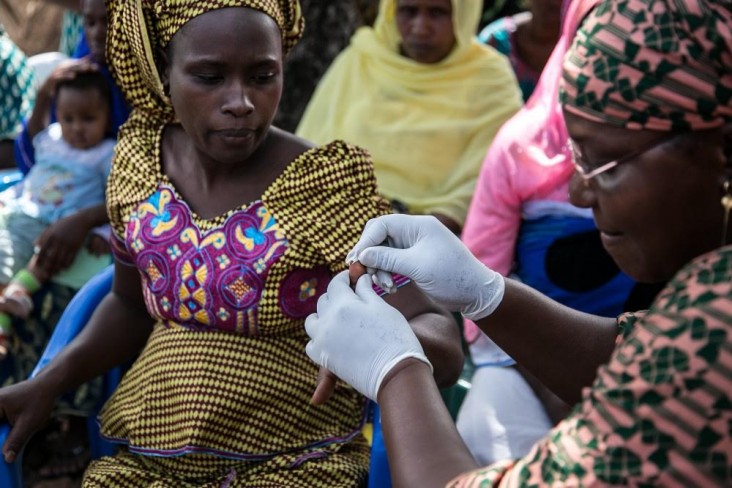
USAID aims to strengthen the health system for improved service delivery in close partnership with government institutions, NGOs and civil society to foster good governance, transparency and equity in the provision of health services. Guinea is also a priority President`s Malaria Initiative country, focused on critical efforts that reduce maternal mortality, increase child survival and prevent and treat infectious disease. USAID seeks to sustain its longstanding investments in the health sector, with on-going post Ebola recovery activities; health system and services strengthening and recently the implementation of the Global Health Security Agenda to prevent, detect and respond to epidemics.
Malaria Treatment, Prevention and Control
This support is provided through the Presidents Malaria Initiative (PMI). Launched in 2005 as 5-year, $ 1.2 billion initiative with the objective of rapidly scaling up malaria prevention and treatment interventions and reduce malaria-related mortality by 50% in the 15 highest-burden countries in sub-Saharan. . Guinea was selected as a PMI partner country in June 2011. Guinea`s approximately 12 million people experience year-round transmissions with the highest risks of contracting the disease between July and October. Malaria is the number one public health problem in the country, taking more lives than any other disease. National statistics show that among children under the age of five years, malaria accounts for 31% of consultations, 25% of hospitalizations, and 14% of hospital deaths in public facilities. PMI intervenes in 14 out of 38 districts of the country and the 5 communes of Conakry which accounts for half of the country- the other half being supported by the Global Fund.
PMI’s programming follows the core principles of Global Health Initiative, including encouraging country ownership and investing in country- led plans and health systems. PMI supports multiple interventions in prevention, diagnosis and treatment of malaria with a particular focus of children under the age of five years and pregnant women. The support also includes capacity building of the Ministry of Health, the National Malaria Control Program (NMCP), improving monitoring and evaluation; and promoting research and innovation. In addition, PMI procures and makes available long lasting insecticide treated bed nets (LLINs), diagnostics and treatment kits and supports the strengthening of the pharmaceutical and supply chain system in Guinea.
Capacity building for the NMCP to coordinate malaria prevention and control activities including LLINs will contribute to NMCP’s overall objective of reaching universal coverage with proven malaria preventive methods and essential malaria services and commodities at all levels of health system in half of the country that is supported by PMI. Increased knowledge and behavior change in the use of malaria commodities among the general population. With PMI support, the country will have well- trained health facility providers and community health workers in the target areas and in the country as whole in areas of Focused Antenatal and the prevention of malaria in pregnancy and case management. In addition, through the training of laboratory staff, malaria diagnostic capacity will be improved. Continued support for the pharmaceutical system to strengthen the logistics and information management system, pharmaceutical system reform and improvement of drug regulation capacity will lead to continued availability of quality diagnostics and medicines. Furthermore, entomological support and surveillance of vectors will improve capacity for vector control and whereas the monitoring and evaluation support will contribute to improved quality of the data reported at all levels of the health system.
Health Services Delivery Project
The USAID Health Service Delivery Project (HSD) is the Mission’s flagship bilateral implementing mechanism supporting the collaborative development of Guinea’s health system. Activities under the HSD will ensure that an essential integrated care package for high quality family planning and maternal, newborn and child health services are provided in health facilities and the surrounding communities in the regions of Boké, Conakry, Faranah, Kankan, Kindia, Labé, and Mamou. The integrated package is intended to be offered across the home-to- hospital continuum of care through which key project interventions will ensure that high quality care is available at each level, along with access to information and referrals for serious illnesses, obstetric fistula and long-acting and permanent family methods.








Comment
Make a general inquiry or suggest an improvement.